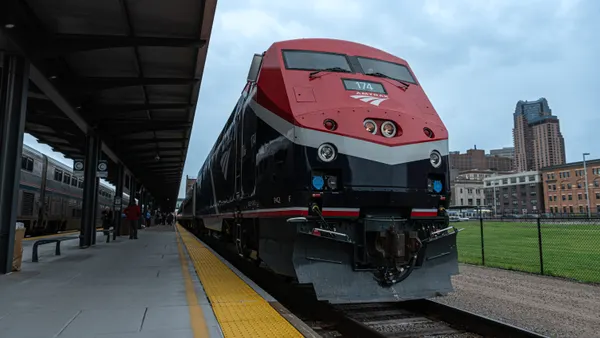Dive Brief:
- The Washington Metropolitan Area Transit Authority (WMATA) is considering a program dubbed the "Rush Hour Promise" that would refund riders who encounter delays of 15 minutes or more during peak hours. A Metro board committee advanced the proposal on Thursday, and a final vote is expected on Jan. 25, according to The Washington Post.
- Rail riders who experience more than a 15 minute delay would automatically receive credit back on their SmarTrip cards, while bus riders would need to fill out online refund requests. Bus refunds would be determined after cross-checking the claims with bus disruptions.
- If passed, the program could launch as soon as Jan. 26 and would run through the 2018 calendar year before being evaluated for renewal. It is estimated the program would cost between $2 million and $3.5 million.
Dive Insight:
From electrical fires to simple scheduling complications, WMATA has struggled to keep up with transit demand over the last decade — and that struggle has been evidenced by the significant drop in rail passengers year after year. Folks have brought attention to the problem by sharing photos of crowded metro platforms and tweeting to accounts such as Unsuck DC Metro (which has more than 83,000 followers), all to pressure the agency to improve the system.
You call that (https://t.co/EycaEGlHNe) a "massive delay"? #wmata pic.twitter.com/UYfMJNLz9p
— Jeff (@nevertweety) July 17, 2017
Some have even gone so for as to create a website, and an associated Twitter account, to alert riders if there's a fire on one of the Metro lines — a common occurrence, according to the account.
Shawty fire burning on Metro. Twitter is reporting fire/smoke on the red line. https://t.co/Ke5MT5fnwt
— Is Metro On Fire? (@IsMetroOnFire) January 3, 2018
WMATA ridership was especially rocked last year when the agency rolled out a year-long SafeTrack maintenance program to address efficiency and safety issues, mainly around electrical problems. Bike-share and ride-share systems become more popular across DC during that time, yet now that the Metro is fully operational and equipped with new cars and services, WMATA is ready to take back its crown as the city's top transit service.
Convenience and price are the keys to succeeding, especially among competition. If a train ride and a bike ride are comparative price points, but the train has significant delays, a bike ride logically becomes the better choice. This proposed system to regain rider trust in Metro — through potentially free rides — is a seemingly simple, low-risk solution. If passed, this program may also become a role model for other transit systems that experience similar complications and rider frustrations, from New York to Boston to Los Angeles.
Though there would be a financial burden on WMATA to roll out the system, officials are willing to pay the price. The Washington Post reports that officials hope the program could "win back" enough riders to make up for the cost of the reimbursed fares. "We want to show our customers that we’re accountable for delivering reliable service," Lynn Bowersox, assistant general manager for customer service, told the Post. Whether or not this system would put pressure back on the system and cause more delays in the future is to be seen.












